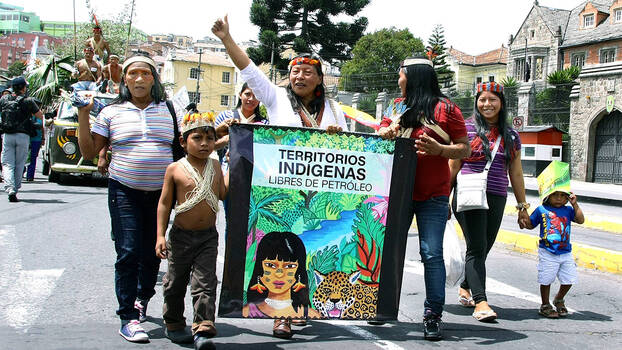
Ecuador’s poor security situation had a profound effect on the August 2023 elections. However, referendums on extractivist projects in the Chocó Andino and Yasuní regions, which took place in parallel with the elections, made two things clear: there are economic alternatives to extractivism, and there is broad support for them among the population.
Carolina Loza León is a freelance journalist. She reports on current affairs, international politics, and human rights issues from Ecuador and Colombia for international media.
On 20 August, 68 percent of voters across Greater Quito voted against granting new mining concessions and in favour of preserving biodiversity in the Chocó Andino region. On a national level, 59 percent of the population was in favour of stopping oil production in Yasuní National Park, located in Ecuador’s Amazon region.
Activists from the environmental organization Acción Ecológica and other collectives, with particular support from young environmentalists, have pushed for a referendum on oil extraction in Yasuní National Park for over ten years. Until 2013, former President Rafael Correa upheld a plan not to extract oil from Yasuní National Park as long as other countries paid compensation to Ecuador for leaving it in the ground. The Yasunídos Collective was founded as a non-partisan, independent, and self-organized group with the aim of continuing the no-extraction initiative from a civil society position when Correa abandoned it.
The Yasunídos have repeatedly been hindered in their efforts to curtail extractive activities in the region, as, for example, when nearly 400,000 signatures they had collected for the referendum against oil extraction in the Yasuní region were discounted in 2014. Additionally, some oil extraction began in the region even before the referendum results were in. The Yasunídos protested, bringing their case before the Constitutional Court on 9 May 2023 and finally clearing a pathway for a national referendum that would answer the question: “Do you agree that the Ecuadorian government should leave the crude oil (in Yasuní National Park, also known as Block 43) in the ground indefinitely?”
The campaign against oil extraction went to great lengths to inform more than 5 million Ecuadorians about the conflict over oil and eventually convinced a majority to vote against its production. This was a difficult task because natural resource processing has historically been a cornerstone of the regional economy. In his book Buen Vivir, economist Alberto Acosta notes that, in Latin America, “the metropole’s dependence on the extraction and export of raw materials remains practically unchanged to this day”. This has been particularly true for Ecuador since economic exploitation began in the Amazon region in the 1960s.
While revenues from oil extraction flowed into national treasuries, communities living near oil production areas suffered from the negative health effects of a polluted environment without being able to improve their standard of living in any significant way. Despite the fact that, according to the Yasunídos, revenues from oil production in the Yasuní between 2007 and 2013 exceeded original estimates, the region has not overcome the poverty that millions of Ecuadorians still live in today.
Katy Machoa, a human rights defender and former president of the Confederación de Nacionalidades Indígenas del Ecuador (Confederation of Indigenous Nationalities of Ecuador, CONAIE), refers to Acosta when explaining why Yasuní National Park’s oil should remain in the ground: “The state’s budget benefits from oil revenues while we [Indigenous communities] only ever experience the downside”. Alex Samaniego, a scientist and activist with Scientist Rebellion Ecuador, emphasizes that “it takes a lot of effort to get out of the role of simply supplying raw materials”.
The three prior governments were not prepared to make that effort, and even current president Guillermo Lasso has taken a different route. The ministers of his administration, along with the state-run oil company Petroecuador, led the “No” campaign against ending oil production. The main argument in favour of oil production in the Yasuní has always been an economic one: expected profits of 1.2 billion US dollars annually.
The referendums demonstrate that political action does not require a party, and that a common goal can bring different sectors of society together.
Among other tactics, Petroecuador tried to stop approval of the referendum via the Constitutional Court, citing the possibility of lost revenues. However, that 1.2 billion figure is disputed: online platform GK calculated that, after deducting all extraction, marketing, financing, and logistics costs, the actual net value is only around 148 million dollars per year.
Sofia Torres, a spokesperson for the Yasunídos, considers the idea that oil is an engine for economic development to be a misconception. She says that this became evident in discussions about the negative consequences of oil production with Indigenous communities in the run-up to the referendum:
I had the opportunity to sit in on an informational workshop with the Kayambi community, with mostly smallholders in attendance. All the participants had experienced the impact of climate change on their daily agricultural lives. For people who are marginalized by the state, it is increasingly difficult to maintain food sovereignty or even the basic conditions for food production.
As part of its campaign, the Yasunídos collective lists ten alternatives that could replace the revenue generated by oil extraction, including biomedicine, bio-industry, gas processing, and fairer tax policies. Alex Samaniego emphasizes that community-based tourism could also contribute, suggesting that “these alternatives are the key to a more equitable distribution of income”.
Fight for the Chocó Andino Biosphere Reserve
The Chocó Andino, made up of the six municipalities of Nono, Calacalí, Nanegal, Nanegalito, Gualea, and Pacto, lies around 40 kilometres from the Ecuadorian capital of Quito. The Chocó Andino is a biosphere reserve with diverse woodlands and conservation areas inhabited by rare animal species, such as the Andean bear. However, the Chocó Andino is also rich in deposits of gold, copper, and platinum. For more than 15 years, a segment of the local population has fought for the preservation of nature and against the expansion of mining on their doorstep.
The government granted mining concessions for the Chocó Andino despite the fact that UNESCO declared it Ecuador’s seventh biosphere reserve. At the time of the referendum, eleven permits for raw material mining had already been awarded and another six were in the approval process. In accordance with the outcome of the referendum, permits already approved are now suspended. Activist group Quito sin minería (Quito without Mining), which initiated the referendum, states that “mining in areas as sensitive as the Chocó Andino can have irreversible effects and a permanent impact both biodiversity and the region”.
This referendum was held on a local level, and only voters living in the Quito Metropolitan District answered the four questions about large-, medium-, and small-scale mining as well as traditional artisanal mining in the region. Given the localized nature of the vote (in contrast to the national referendum on the Yasuní), activists focused on the impact of metal mining on the Quito region, emphasizing the threat to the forests and potential water pollution and contamination of the water sources that supply the Ecuadorian capital.
Now that the referendum has passed, the government cannot issue new mining exploration licenses. However, that does not apply retroactively, meaning that licences that have already been granted are still valid.
What Do the Referendums Mean for Democracy?
The referendums demonstrate that political action does not require a party, and that a common goal can bring different sectors of society together. Plebiscites have now proven to be a democratic resource in which Ecuadorian civil society actively politically participates.
For Katy Machoa, the initiative for the Yasuní referendum was a large-scale “minga” that was supported by various social sectors. Minga is an Indigenous word meaning community work, where different participants contribute their knowledge and resources in pursuit of a common goal.
Sofia Torres, a spokesperson for the Yasunídos, saw a “young campaign in which feminist collectives came together, even from remote parts of the country, to disseminate information for the national Yasuní campaign”. Campaigners succeeded in reminding voters, in the midst of presidential and National Assembly elections, that there are environmentally friendly alternatives to extractivism. Torres suggests that, precisely because the security concerns at the time “seemed to lead people to rely more on mining revenues for greater investment in the security apparatus, it was all the more gratifying that the people ultimately chose life and conservation”.
Alex Samaniego highlights international reactions to the results in Ecuador, stating that “In Europe, it was very well received”. In an article for openDemocracy, Samaniego mentions that activists in Brazil cite Ecuador as a model of social dialogue about economic alternatives to extractivism.
Torres, Machoa, and Samaniego are aware that passing the referendum was just the first step towards stopping extractivist projects in Ecuador and that organizations like Acción Ecológica and Yasunídos should continue to monitor effective implementation of the referendums from a civil society perspective. Samaniego, a scientist, has pointed out that the successful referendum has sparked debate about the transition to green energy and democracy in Ecuador.
However, he also states that “we won't be surprised if we have to keep fighting to implement the referendum”. This suspicion was confirmed shortly after the votes were tallied, when Minister of Energy and Mining Fernando Santos Alvite declared that the referendum would only have to be implemented after the next government takes office, and President Lasso referred to the referendum as “inapplicable” in a video.
The government’s attitude is troubling for lawyer and academic Andrés Aguirre, who states that, “in legal terms, the Court of Electoral Challenges and the Constitutional Court should clarify and monitor what the state does”. In fact, the Constitutional Court ruling that allowed the referendum states: “In the event of a positive decision by voters, the gradual and orderly cessation of all activities related to oil production must be implemented within a period of no more than one year from the announcement of the official result”.
The citizen-led movement that fought for a referendum on oil production now faces a new challenge: ensuring that the referendum is implemented despite early elections and the poor security situation in Ecuador.
Translated by Eve Richens and Joseph Keady for Gegensatz Translation Collective.
